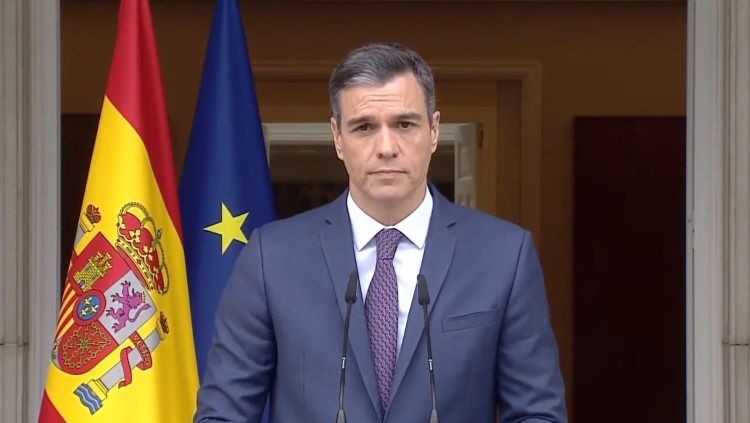Eduardo González
The President of the Government, Pedro Sánchez, assumed yesterday “in first person” the heavy defeat of the PSOE in the autonomic and municipal elections of this past Sunday and announced the holding of early general elections for next July 23, barely a month after Spain assumes the Presidency of the Council of the EU.
“As President of the Government and also as Secretary General of the Socialist Party, I assume in first person the results and I believe it is necessary to give a response and submit our democratic mandate to the popular will”, assured Sánchez during an institutional statement without questions at the Moncloa Palace. Likewise, the Chief Executive informed that the early elections will be held on July 23rd, that the formal call will be published in the Official State Gazette of Tuesday, and that King Felipe VI has already communicated the call for an extraordinary Council of Ministers (held yesterday and which forced the Minister of Foreign Affairs, José Manuel Albares, to suspend his participation in the meeting of the Global Security Forum Globsec, in Bratislava) and the dissolution of the Cortes, which will take place Wednesday, in order to comply with the legal deadlines.
According to Sánchez, Spain is about to overcome the crises caused by the COVID-19 pandemic and the war in Ukraine with “a clear path of growth, job creation and social cohesion”. Likewise, he continued, at this stage of the legislature, the Government has already brought forward “the major reforms committed to in the investiture speech, in the Government program and also in our agreement with the European Commission”. “Furthermore, our country is about to carry out a very important responsibility in this geopolitical context that Europe is experiencing, and that is the rotating Presidency of the Council of the European Union,” he recalled.
“All these reasons advise a clarification on the will of the Spanish people, a clarification on the policies to be applied by the Government of the nation and a clarification on the political forces that must lead this phase,” he declared. “There is only one infallible method to solve these doubts, that method is democracy”, he added. Therefore, “the best thing is that Spaniards take the floor and speak out without delay to define “the political course of the country”, he concluded.
Spanish Presidency
Sánchez’s coalition government was formed after the November 2019 elections, so it was initially due to conclude its mandate at the end of 2023 or early 2024, after the call for general elections that were almost certainly going to be held on December 10. Finally, Spain will go, for the first time in its history, to a general election in the middle of the summer vacations.
The Constitution does not establish specific deadlines between the holding of a general election and the investiture of the new government. Normally, the parties usually take a month to reach an agreement on who should be the president of the Congress of Deputies. There is also no time limit on the duration of the investiture negotiations and the Constitution limits itself to a maximum period of two months between the first investiture vote and the formation of the new Government.
In any case, the elections will be held just three weeks after Spain assumes, for the fifth time, the Presidency of the Council of the European Union -which will begin on July 1 and end on December 31- and, therefore, the investiture negotiations and the formation of the new Government will most probably condition the first three months of the Presidency, during which the host country will be in the hands of an acting Government.
The Spanish semester will take place in the last leg of the European institutional cycle, before the European Parliament elections scheduled for May 2024 and the subsequent appointment of a new Commission. It will also include numerous high-level events in a large number of Spanish cities, including informal ministerial meetings (including the Foreign Affairs and Defense Council in Toledo at the end of August), meetings of Permanent Representatives to the Union (COREPER), the meetings of the European Political Community (the Heads of State and Government of the 27 EU countries plus countries such as the United Kingdom, Ukraine or Turkey) and the Informal European Council of Heads of State or Government of the 27 EU countries (both in Granada in early October), the EU-CELAC Summit (which will take place in Brussels but within the framework of the Spanish Presidency) or the EU-Western Balkans ministerial meeting in Valencia.







